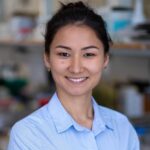Grant Coach Office Hour via ZOOM
Have a question about your grant proposal? Meet one-on-one with our trained Grant Coaches to answer questions, find resources, obtain advice or evaluate draft documents. Grant Coach Office Hours are generally limited to 2 hours per trainee per year.
Request a meeting with a Grant Coach: Signup (click here)
Grant Coaches:
 Dr. Cellas Hayes received his BA and PhD from the University of Mississippi, Oxford, MS. His graduate work was focused on understanding neuroendocrine cell specific mechanisms of neuroprotection in cognition and ischemic stroke outcomes, respectively. In his postdoctoral studies, he focuses on the concomitance of Alzheimer’s Disease and Cerebrovascular Disease to understand overlapping pathological contributions to fluid biomarker changes and functional outcomes such as cognition. Dr. Hayes values the importance of building long lasting professional relationships, science communication, DEI advocacy, grant writing/coaching.
Dr. Cellas Hayes received his BA and PhD from the University of Mississippi, Oxford, MS. His graduate work was focused on understanding neuroendocrine cell specific mechanisms of neuroprotection in cognition and ischemic stroke outcomes, respectively. In his postdoctoral studies, he focuses on the concomitance of Alzheimer’s Disease and Cerebrovascular Disease to understand overlapping pathological contributions to fluid biomarker changes and functional outcomes such as cognition. Dr. Hayes values the importance of building long lasting professional relationships, science communication, DEI advocacy, grant writing/coaching.
 Dr. Samuel Thompson (Department of Bioengineering, under Polly Fordyce) believes that biotechnology can tackle challenges in pollution, climate change, and pathogenic resistance. They engineer proteins as advanced materials that fold and function in non-aqueous solvents. Raised in West Texas, educated in Boston and San Francisco (with significant stints in Japan and Singapore) – they believe that new contexts challenge us and our preconceptions. Samuel was fortunate to have early career mentors who openly co-wrote grants with trainees, a goal that Samuel shares. Samuel also dabbles in abstract drawing, creative writing, and cooking/baking. Ask them about sage banana bread.
Dr. Samuel Thompson (Department of Bioengineering, under Polly Fordyce) believes that biotechnology can tackle challenges in pollution, climate change, and pathogenic resistance. They engineer proteins as advanced materials that fold and function in non-aqueous solvents. Raised in West Texas, educated in Boston and San Francisco (with significant stints in Japan and Singapore) – they believe that new contexts challenge us and our preconceptions. Samuel was fortunate to have early career mentors who openly co-wrote grants with trainees, a goal that Samuel shares. Samuel also dabbles in abstract drawing, creative writing, and cooking/baking. Ask them about sage banana bread.

Dr. MK Quinn is a postdoctoral fellow in the Department of Pediatrics at Stanford Medical School. She has her PhD in Population Health Sciences. Her research focuses on how policy impacts preterm infant health. She worked with the Grant Writing Academy to successfully submit an F32, and she had such a good experience that she applied to join the grant coaching team. She’s excited to work with students and postdocs on their applications. In her free time, you can find her out on the trails with her dog.

Dr. Amy Nippert is a postdoctoral scholar at Stanford where she researches chronic pain. In both her graduate and postgraduate work, Amy has written multiple grants as well as served on informal grant study sections. In parallel to her academic writing, Amy has also focused on science communication, writing and editing articles for the general public. Amy is passionate about helping others achieve their writing goals. Starting from an undergraduate position as a writing tutor, she has continued to teach, mentor, and edit. As a grant coach, Amy is excited to help guide graduate students along the grant writing journey. In her spare time, Amy enjoys curling, ceramics, and reading science fiction.

Dr. Rebekah Gullberg is a postdoctoral fellow in the Biology department, where a Dean’s Fellowship funded her research on how infectious viruses are built inside human cells. This past year, she participated in the Women Empowerment K-series boot camp, where she learned grant-writing skills and reflected on her scientific journey, career goals and vision for her future. Since this experience was so powerful for her, she is eager to provide similar experiences for others by being a grant coach. She also volunteers as chair of the sports groups with SURPAS where she leads hikes and encourage postdocs in active communities.

Dr. Iris van ‘t Erve is a Postdoctoral Fellow in the Diehn lab at Stanford University School of Medicine. She studies cell-free nucleic acids in the blood of cancer patients to personalize cancer treatments. Dr. van ‘t Erve’s research is funded by the Rubicon fellowship from the Dutch Research Council. The Falling Walls Foundation honored her as one of the top 20 female science talents of 2023. Beyond her primary research grant, Dr. van ‘t Erve has secured numerous grants and awards. Iris is passionate about teaching. Leveraging her expertise, she serves as a grant writing coach, guiding international graduate students and postdocs to success in their grant writing endeavors.

Dr. Albina Ibrayeva received her MS and PhD from University of Southern California, Los Angeles USA. Her graduate work was focused on understanding the cellular and molecular mechanisms underlying the decline of hippocampal activity with age. In her postdoctoral studies she focuses on understanding how different immune challenges accelerate neurodegeneration and cognitive decline during physiological aging. Dr. Ibrayeva values the importance of building collaborative relationships, empowering researchers to effectively present their ideas, and making a positive impact through diverse projects. She is committed to assisting others and focusing on ethical and responsible coaching, which contributes to the creation of a supportive community that fosters academic growth and research innovation.